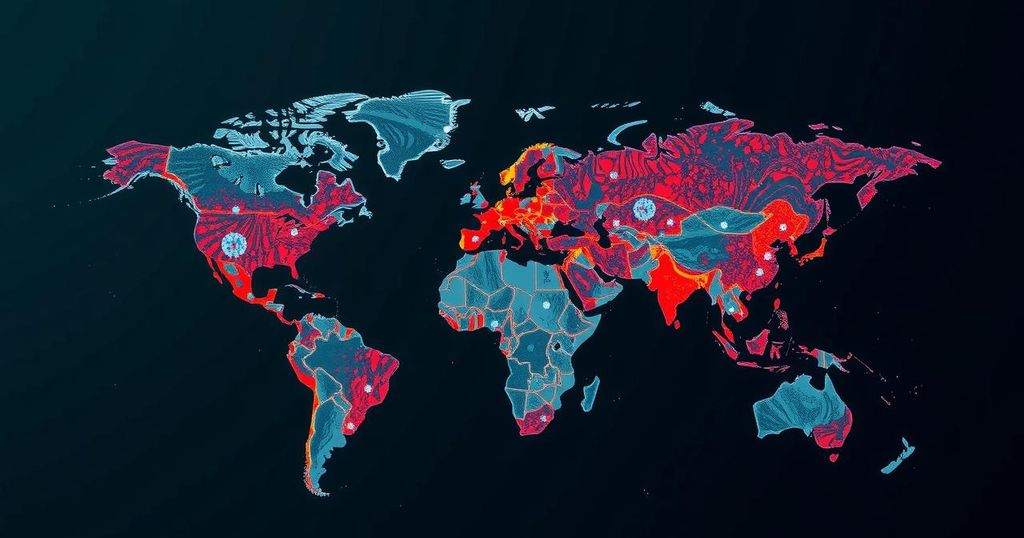Weather
AFRICA, AFRICA CENTRES FOR DISEASE CONTROL AND PREVENTION, BURUNDI, CENTRAL AFRICA, DEMOCRATIC REPUBLIC OF CONGO, DISEASE, DISEASE OUTBREAK, DR CONGO, DRC, KENYA, MEDICINE, RAIN, RWANDA, TRAVEL ADVISORY, UGANDA, WEATHER FORECAST, WEST, WHO, WORLD HEALTH ORGANIZATION
Marisol Gonzalez
0 Comments
Understanding Mpox: Symptoms, Transmission, and Global Response
Mpox, previously called monkeypox, has become a pressing public health emergency, especially in Africa. It is marked by a significant rise in infections and fatalities, prompting global health organizations to take action. The disease is transmitted through close contact, and specific clades like Clade 1b are raising concerns due to their severity and higher transmission rates. Vaccines exist, but distribution is limited, necessitating urgent, coordinated responses to mitigate its impact.
Mpox, formerly known as monkeypox, is a viral disease that has recently been declared a public health emergency of international concern by the World Health Organization (WHO). Highly contagious, mpox has resulted in at least 450 fatalities in the Democratic Republic of Congo (DRC) alone. This disease primarily affects individuals in remote villages within the tropical rainforests of West and Central Africa but has recently been observed in neighboring countries, leading to significant health concerns.
The mpox virus belongs to the same family as smallpox, although it generally presents a lower health risk. Initial symptoms typically include fever, headaches, swelling, back pain, and muscle aches. Following the fever, a rash often develops, beginning on the face and subsequently spreading to other areas of the body, particularly the hands and feet. The rash can be intensely itchy or painful, progressing through various stages until it forms scabs that eventually fall off. Although the infection typically resolves itself within 14 to 21 days, it can lead to severe complications or death, especially in vulnerable populations such as young children.
Mpox is notably prevalent in the DRC and has been reported in countries such as Burundi, Rwanda, Uganda, and Kenya, where it is not endemic. There exist two main clades of mpox: Clade 1, which is associated with more severe illness, and Clade 2. Clade 1b, a newer and more severe strain of mpox, has raised significant alarm among health officials, as it appears to spread more easily and disproportionately affects children. As per the Africa Centres for Disease Control and Prevention, there were over 14,500 mpox infections and more than 450 deaths reported from the beginning of 2024 to the end of July, indicating a substantial rise in both infections and fatalities compared to previous years.
Transmission occurs primarily through close contact with infected individuals via skin-to-skin contact, respiratory droplets, and sexual interactions. The virus can also be contracted from contaminated objects and close contact with infected animals. The rising cases are attributed to sexual contact among adults and increasing close interactions within communities, prompting experts to analyze the most at-risk groups. Children, pregnant women, and individuals with weakened immune systems are at greater risk due to various socio-economic factors and lack of immunizations against similar viruses. The WHO advises that preventive measures include maintaining distance from infected individuals and practicing good personal hygiene.
Existing vaccines are available for mpox, yet their distribution is limited to individuals at high risk or those in close contact with infected persons. Concerns regarding insufficient funding to ensure widespread vaccination have been raised. In response to escalating cases, the WHO has urged pharmaceutical manufacturers to expedite vaccine availability, even for unapproved options. As the Africa CDC formally declares a continent-wide public health emergency, enhanced governmental coordination and increased medical supply distribution are anticipated to combat the ongoing outbreaks. Without substantial global efforts, there remains a significant risk of the disease spreading beyond Africa, necessitating immediate action to mitigate its impact.
Mpox, formerly known as monkeypox, has re-emerged as a significant public health threat, particularly in parts of Africa. The disease is primarily found in tropical rainforests and predominantly affects populations in the DRC, where there are high annual rates of infection and mortality. The recent increase in cases has raised alarms, prompting international health organizations to classify it as a public health emergency. This situation is exacerbated by the presence of multiple clades of the virus, particularly Clade 1b, which is new and appears to pose a greater risk. Understanding the disease’s transmission routes and vulnerable groups is critical for developing effective preventive and control strategies, especially in light of evolving public health challenges.
In summary, mpox is an evolving public health concern that requires immediate attention due to its increased transmission and rising mortality rates. The recently declared health emergency underscores the necessity for coordinated international efforts to enhance prevention, control, and vaccination strategies. Protecting vulnerable populations, particularly children and individuals with weakened immune systems, is imperative for effective disease management. Continued research and communication among health organizations will be essential in combating this outbreak and preventing its spread beyond affected regions.
Original Source: www.bbc.com




Post Comment